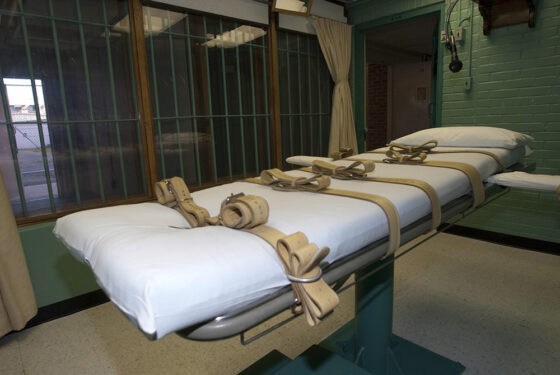
WASHINGTON — Alabama was set to put James Barber to death July 20 in its first execution since a pause on capital punishment in the state was lifted in February.
The state had stopped carrying out executions for three months while investigating two previous failed lethal injection attempts on other inmates last year.
Barber, who is 64, was set to die by lethal injection for the beating death of a 75-year-old woman 22 years ago.
A federal appeals court panel July 19 rejected Barber’s request to block his execution over fears he could be subjected to “substantial harm.”
In the 2-1 ruling, the majority said the lower court was correct in its finding that the Alabama Department of Corrections had amended its execution procedures. A dissenting opinion criticized the state’s execution review process for being conducted “entirely outside the scope of any court’s or the public’s scrutiny, and without saying what went wrong or what it fixed as a result.”
It also said that the state’s willingness to try again with its use of lethal injection places “Barber as its guinea pig,”
While in prison, Barber formed a friendship with Sarah Gregory, a granddaughter of the victim, who has said that she forgives him and doesn’t want to see him executed.
“I don’t want it to happen,” she told The Atlantic magazine, adding: “I don’t want to see it done…it will be hard. I spent so long believing in ‘an eye for an eye’ — I’ve changed.”
She also said some relatives did not feel the same way that she does.
This February, about a dozen Catholic priests and women religious in Alabama, joined more than 170 local faith leaders in a letter to Alabama Gov. Kay Ivey thanking her for pausing executions in the state and urging that the review of the state’s procedures be public.
The faith leaders also raised questions about the state’s use of capital punishment.
“How can we claim to be a state that values human life at all stages if we continue to devalue life in this manner?” the letter said. It also stressed that the death penalty “precludes the possibility of redemption.”
The local faith leaders said redemption is possible even for “those who have committed the most heinous of crimes” but that “death cuts short this search for redemption.”
Catholic Mobilizing Network, a group working to end capital punishment, points out on its website that 66 executions have taken place in Alabama since 1976.
It also notes that the state’s death penalty has one of the highest error rates in the country. For every seven people who have been executed one person has been exonerated.
The site also included an online letter to submit to Gov. Ivey asking her to oppose Barber’s execution.
The letter says: “At the center of my Catholic faith is the belief in the sanctity of life and the inherent dignity of the human person. This dignity is inviolable and cannot be lost even after the commission of a serious crime.”
Acknowledging the victim and her family, the letter adds: “I do not forget the pain endured by Mr. Barber’s victim, Dorothy Epps, nor do I forget the grief and suffering of her family and loved ones. As a Church, we pray for their continued healing.
“We do not, however, condone this potential execution as a form of justice,” it concludes.
